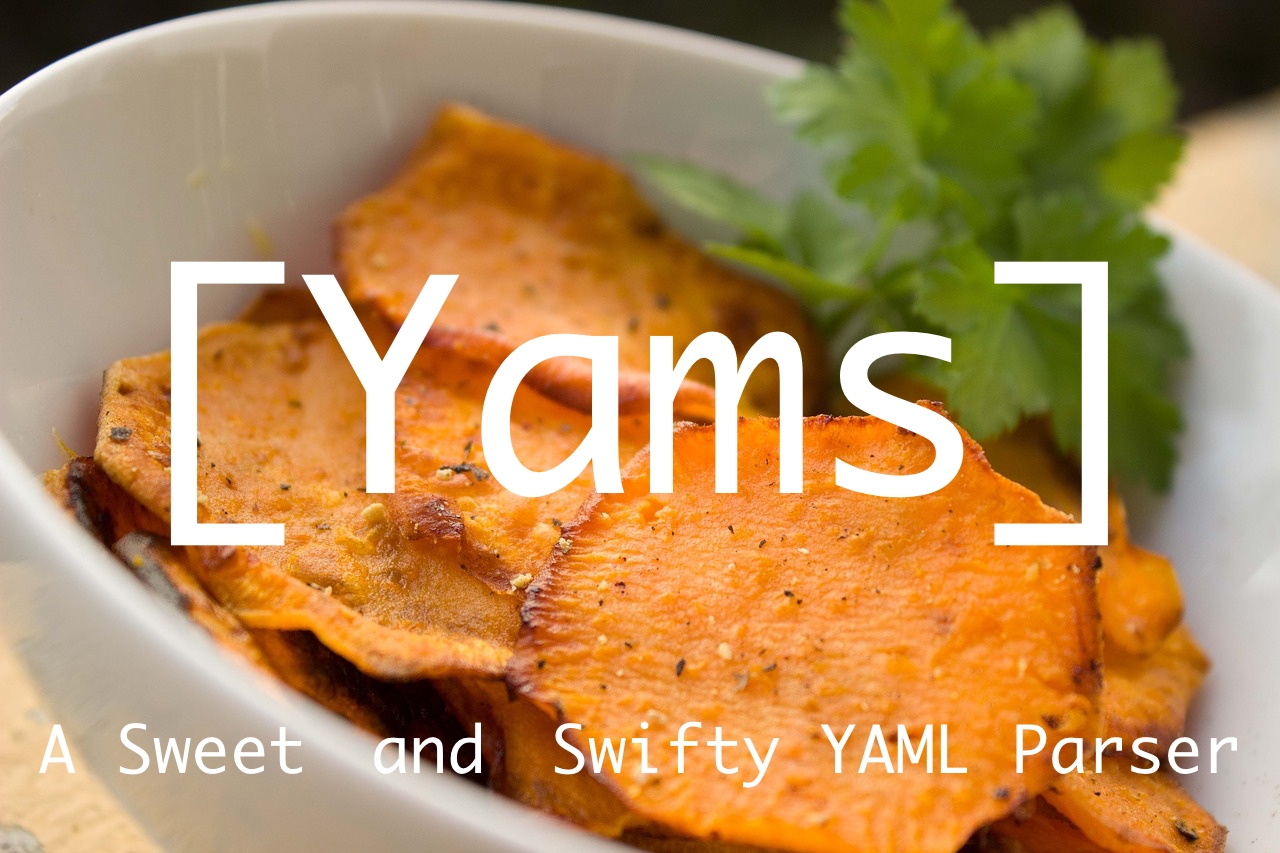A sweet and swifty YAML parser built on LibYAML.
Building Yams requires Xcode 10.x or a Swift 4.x/5.x toolchain with the Swift Package Manager.
Add .package(url: "https://github.com/jpsim/Yams.git", from: "2.0.0") to your
Package.swift file's dependencies.
Add pod 'Yams' to your Podfile.
Add github "jpsim/Yams" to your Cartfile.
Yams has three groups of conversion APIs:
one for use with Codable types,
another for Swift Standard Library types,
and a third one for a Yams-native representation.
- Codable is an encoding & decoding strategy introduced in Swift 4 enabling easy conversion between YAML and other Encoders like JSONEncoder and PropertyListEncoder.
- Lowest computational overhead, equivalent to
Yams.Node. - Encoding:
YAMLEncoder.encode(_:)Produces a YAMLStringfrom an instance of type conforming toEncodable. - Decoding:
YAMLDecoder.decode(_:from:)Decodes an instance of type conforming toDecodablefrom YAMLString.
import Foundation
import Yams
struct S: Codable {
var p: String
}
let s = S(p: "test")
let encoder = YAMLEncoder()
let encodedYAML = try encoder.encode(s)
encodedYAML == """
p: test
"""
let decoder = YAMLDecoder()
let decoded = try decoder.decode(S.self, from: encodedYAML)
s.p == decoded.p- The type of Swift Standard Library is inferred from the contents of the
internal
Yams.Noderepresentation by matching regular expressions. - This method has the largest computational overhead When decoding YAML, because the type inference of all objects is done up-front.
- It may be easier to use in such a way as to handle objects created from
JSONSerializationor if the input is already standard library types (Any,Dictionary,Array, etc.). - Encoding:
Yams.dump(object:)Produces a YAMLStringfrom an instance of Swift Standard Library types. - Decoding:
Yams.load(yaml:)Produces an instance of Swift Standard Library types asAnyfrom YAMLString.
// [String: Any]
let dictionary: [String: Any] = ["key": "value"]
let mapYAML: String = try Yams.dump(object: dictionary)
mapYAML == """
key: value
"""
let loadedDictionary = try Yams.load(yaml: mapYAML) as? [String: Any]
// [Any]
let array: [Int] = [1, 2, 3]
let sequenceYAML: String = try Yams.dump(object: array)
sequenceYAML == """
- 1
- 2
- 3
"""
let loadedArray: [Int]? = try Yams.load(yaml: sequenceYAML) as? [Int]
// Any
let string = "string"
let scalarYAML: String = try Yams.dump(object: string)
scalarYAML == """
string
"""
let loadedString: String? = try Yams.load(yaml: scalarYAML) as? String- Yams' native model representing Nodes of YAML which provides all functions such as detection and customization of the YAML format.
- Depending on how it is used, computational overhead can be minimized.
- Encoding:
Yams.serialize(node:)Produces a YAMLStringfrom an instance ofNode. - Decoding
Yams.compose(yaml:)Produces an instance ofNodefrom YAMLString.
var map: Yams.Node = [
"array": [
1, 2, 3
]
]
map.mapping?.style = .flow
map["array"]?.sequence?.style = .flow
let yaml = try Yams.serialize(node: map)
yaml == """
{array: [1, 2, 3]}
"""
let node = try Yams.compose(yaml: yaml)
map == nodeBoth Yams and libYAML are MIT licensed.
